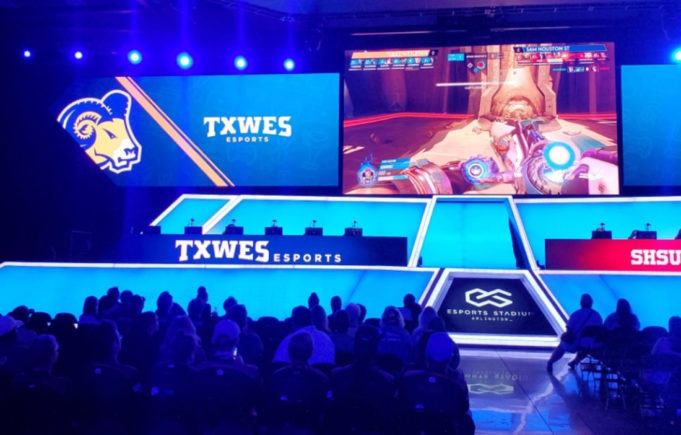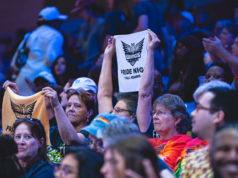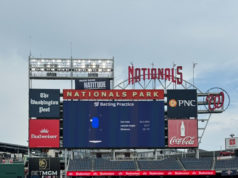My wife doesn’t understand video games. Granted, she was a preteen in the 1990s and a cheerleader. Now an academic, she wasn’t the target market for console or PC games as they were coming of age. That was mostly teenage boys and arguably still is. Myself, as an educator and father, I witness every day that video games are more popular than ever and have transcended gender, socioeconomics, and platforms. Consumers from every walk of life play them everywhere thanks to smartphones and mobile devices like the Nintendo Switch. Also, for the first time in human history, there are retirement-eligible people who have played video games of some kind their entire lives.
One Fort Worth university, and not the one you’re probably thinking of, is leveraging the cultural assimilation of video games and esports into their curriculum to stand out among other North Texas universities. Eugene Frier, director of esports and gaming at Texas Wesleyan University, grew up, like many of us, playing games of all kinds. A UNT graduate, Frier made his first foray into competitive gaming on the campus local area network (LAN) against other Mean Green students.
“I was good enough to know that I wasn’t,” Frier recalled.
One of the first teams to win real money at a Halo tournament hosted by XBOX was anchored by two North Texans, one of whom was another UNT student. Frier, who stayed at UNT to complete his master’s in higher education, was hired at Texas Wesleyan as an assistant dean of student life in 2015 and is a lifelong gamer. He sought avenues to help the small private school shine among a competitive academic landscape.
“I was raised on a military base in England,” Frier said. “I met recruiters from TCU and SMU while on base. Texas Wesleyan doesn’t have that.”
Frier wasn’t thinking about video games as that value proposition for his school but saw the success that schools such as Illinois and the University of California-Irvine had, as well as their facilities. Frier pitched the program, now in its fifth year, as an addition to varsity athletics.
The athletic department deferred but offered their support for the program within the university. Esports and Gaming is not under the umbrella of varsity sports but is a standalone department. That’s when the independent program was born, and Frier’s job changed.
“Quickly, I realized how many students we were ignoring by starting with a narrow focus just on competition,” he said. “Even now, we’re not positioned to compete with even other local schools. When I was at UNT, they had almost 400 students in their organization. That’s as many as we have living in the dorms.”
Though Wesleyan won the EA Sports FIFA national championship in 2021, the school enrolls barely 2,600 students while, for comparison’s sake, more than 40,000 study at UNT, whose athletics department rosters varsity and sub-varsity programs and numerous levels of club teams.
“In some games,” Frier said, “our varsity wasn’t even going to be as good as their second- or third-club team.”
In almost any activity, competitions are conceived and will inevitably grow from anything but especially something designed with a scoring system or based on success or loss. Competitive gaming is not really new. The first documented gaming competition was hosted at Stanford University in 1972, but different from the amateur contests of yore, there are real professional gamers now. Their world is only expanding as video games are no longer a hobbyist time-waster but a real bastion of the modern zeitgeist.
Collegiate esports, as of now, are not governed by the NCAA but organized through the National Association of College Esports (NACE). Frier, who sits on NACE’s board, said which games are played varies and can be somewhat complicated because the companies who own them vary in their involvement. Some companies are intimately involved and want to host competitions and retain control, while others are happy to allow the gamers and organizations to facilitate tournaments independently. Esports is currently being lobbied to the Olympic committee, though it’s unlikely to be included anytime soon.
Competitive teams are broadcast on ESPN affiliates, YouTube, and Twitch streams. Several years ago, I listened to an interview on local sports radio with a gentleman who won a national NBA 2K tournament and was drafted to the Dallas Mavericks’ esports affiliate (Mavs Gaming) to the tune of an $80,000 signing bonus. First-round signees earn a minimum salary of $35K per year with the potential for tournament payouts and bonuses for individual awards. Sadly, the Mavs 2K team’s trajectory is mirroring their dribbling counterparts and are outside the playoff picture for the 5-man team, and the 3-man team didn’t qualify for their tournament. Independent players of other games have the potential to make even more. A list of the Top 100 esports gamers by earnings shows the Danish Johan Sundstein boasting career tournament earnings of more than $7.2 million. Even the 100th player on the list has earned more than $1.5 million in their career. In 2021 alone, esports as an industry paid out more than $240 million.
Compared to more established sports, even those impressive numbers seem nominal, but in only 10 years, the payouts for mouse and controller athletes has increased twentyfold. It wasn’t so long ago (the ’50s and ’60s) that professional football players had to work off-season jobs at steel mills or elsewhere to provide everything their families needed, and many in the Greatest Generation probably scoffed at the Boomers’ aspirations to be professional in athletics of any kind.
Frier — aside from the competitive side of esports — uses the program to build community and career readiness for the East Fort Worth campus and employs his students as de facto interns or account executives of the gaming world. Social media, event production, and management at large are a few areas where program participants work, in addition to training to become masters of their games. Their practices sound like that of any high school or college athlete: A physical warmup, stretching, and mindfulness with visualization occur before game scenarios and match play on a variety of platforms. Participants wear jerseys to compete and work to keep their heart rates under control while their bodies move furiously and efficiently with absolute focus, albeit in a different plane of activity than most think of when they imagine athletes.
The coach and director of one of the few holistic esports programs in the nation — most schools simply have recreational or club teams — is hoping to expand the mass communication class catalog available to his students currently to craft a certificate or minor in esports. Like in most endeavors, the possibility of his athletes becoming professionals is slim, but he is confident the connection to the school — and to others in the program — is keeping them working toward their degree in another field while outfitting them with job skills applicable in an increasingly technology-driven world.
Frier has recently consulted with different independent school districts to bring esports programs to their elementary schools, not necessarily to inspire our kids to play more games but to provide a touchstone and community on campus. In a recent bond election that passed in Denton ISD, esports areas were included among the litany of other improvements to facilities and technology, and they are hardly the first major district to do so.
You can guarantee that esports as a concept and entity is not declining but quite the opposite. Time in the market is one of the essential recipes to success — any investor can tell you that — and video games’ time is still relatively brief. The top chess players in the world all have a net worth greater than $30 million in a game that involves moving pieces around a board and whose spectacle is marginal in comparison. Competitive gaming covers a wide variety of genres, and the entertainment value and connected nature of playing online make the potential earnings for gamers of the future as unlimited as any other professional athlete.












